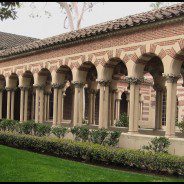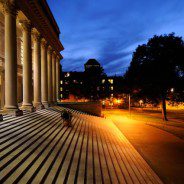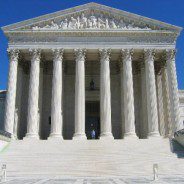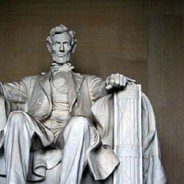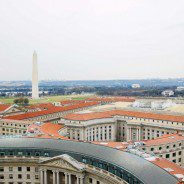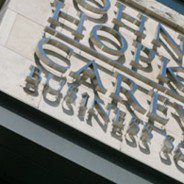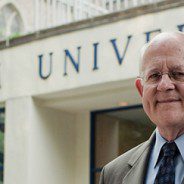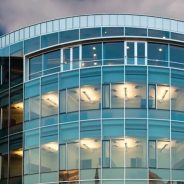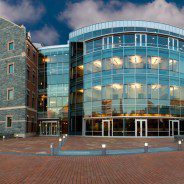Search results for :
Trend Toward Healthcare and High Tech Industries at USC Marshall
Whether the opportunities in healthcare and high technology are growing or whether USC Marshall School of Business graduates merely possess the skill set required to succeed in these fields, Marshall students and graduates are obtaining internships and careers in these industries.
According to a 2012 report from Georgetown University’s Center on Education and Workforce, the healthcare industry comprises 18 percent of the U.S. economy and that estimated growth in the industry will yield 5.6 million new jobs by 2020. As for technology, though the Los Angeles Times reported in August that growth rates in the industry have plateaued, California is second only to Washington, D.C. in terms of the proliferation of high-tech positions, according to the Praxis Strategy Group.
Columbia Organizes Tenth Annual Healthcare Conference
Columbia Business School has announced that it will host its 10th annual Healthcare Conference, which will have the theme “Creating Value-Based Solutions for a Discerning Healthcare Buyer”. The conference aims to address how healthcare professionals can help customers make informed decisions about the value and relative costs of different healthcare services, and enhance outcomes and address the needs of consumers. The conference will discuss how to support technologies and create models to support health care professionals in addressing those goals.
Annually, more than five hundred people from top-tier business schools, including Columbia Business School, and industry professionals attend the conference. The conference offers a variety of panel topics to interest health care students and professionals, including “Biopharmaceuticals,” “Healthcare Merger & Acquisitions and Financing,” “Investing in New Medical Technologies,” “Healthcare Entrepreneurship and Venture Capital,” “Healthcare Services (ACA/Healthcare Reform),” “Healthcare Services (Provider and Payer Strategies).” The conference will also feature three keynote speakers: Robert J. Hugin, the Chairman and CEO of Celgene; Giovanni Colella, the CEO and Co-founder of Castlight Health and a 1995 Columbia MBA Alumnus and Popper Scholar, and Eric C. Rackow, the President and CEO of SeniorBridge Humana. All three keynote speakers have extensive experience in the healthcare industry. Continue reading…
MBA Entrepreneurship Centers Reaching Out to More Students
An article in the latest edition of BizEd Magazine highlights a fundamental shift in the teaching philosophy of entrepreneurship centers at business schools. Some business schools’ entrepreneurship centers have shifted from nurturing the talents of a few skilled potential entrepreneurs to trying to encourage an entrepreneurial culture for the university as a whole.
Not everyone can be or wants to be an entrepreneur. If everyone was an entrepreneur, after all, there would be no support staff to help entrepreneurs get their ventures off the ground. Business schools are starting to use their entrepreneurship centers to educate a wider segment of their university’s population about entrepreneurship to encourage “entrepreneurial thinking”, a skill that will help students contribute to startups or succeed in future careers inside and outside of business. Continue reading…
Villanova Recieves $50 Million Gift
The Villanova School of Business has just announced that it has received a $50 million dollar gift from alumnus James C. Davis ’81 and his wife. Davis is the founder of a private staffing company called Allegis Group. The gift is the largest gift to the university in Villanova’s 170 year history.
The gift is unusual because it is not a naming gift. Often, when individuals give millions of dollars to a school in a single gift, a building, landmark, or even a college is named for the donor. However, Davis wants to pay Villanova back for his “values-based education” by providing money for new technologies, improved career advising, scholarships, and new study abroad and internship opportunities. Continue reading…
Fordham Gabelli to Host Entrepreneurship Conference
On November 13, 2013, Fordham University’s Gabelli School of Business will host TrepCon, an entrepreneurship conference featuring speeches from business leaders, career advice, and networking opportunities. The event runs from 9:00 AM to 6:30 PM and is open to everyone, but is only free for Fordham students and staff. The ticket cost for the general public is $100, and the alumni ticket cost is $25.
The event begins with a breakfast for all participants. The first speaker is John Caplan, the founder and CEO of OpenSky and the TrepCon keynote speaker. OpenSky is a social shopping site that currently has 3 million members. It was named one of Forbes’ 2012 Most Promising Companies, after citing a $4 million dollar increase in revenue over one year, and total revenues of $18 million. Caplan is sure to discuss his experience at OpenSky, but may also talk about his earlier work as the president of About.com and the CEO of Ford Models. Continue reading…
George Mason Elects 20 Alums “Prominent Patriots in Business”
On October 4, George Mason School of Management hosted its Annual Business Alumni Celebration and honored 20 School of Management graduates who best represent the School’s mission and ideals, identifying these individuals as the 20 Prominent Patriots in Business. George Mason describes these Patriots as “engaged citizens, well-rounded scholars, and people prepared to act through innovation, resourcefulness, and entrepreneurialism.” Among the 20 Patriots, four were graduates of George Mason’s full-time MBA program: Bruce M. Case (’01), Harold C. Rauner, Jr. (’86), Daryl Wieland (’96), and Michael Zeiders (’84). Continue reading…
Washington DC MBAs Decline Government Jobs
The number of MBAs in the DC metro taking jobs in government has dropped steeply in recent years. At American University Kogod School of Business’s numbers have dropped by half. At nearby George Washington University School of Business, the decline has been even steeper: from 19% of its graduating class taking government jobs in 2011, just 5% took government jobs last year.
Explanations for the decline vary.
“The reality is that the growth in opportunities is in the private sector,” Gil Yancey, of GW’s School of Business’s career services, recently told BusinessWeek–favoring the theory that MBA students are responding to changes in demand. Continue reading…
DC Schools See Rising Interest in Education Management
MBA students at George Washington University have been enrolling in education courses at increasing rates.
Following a nationwide trend, students have been pursuing an interest in the field despite notoriously low salaries.
“That’s what’s so unique about this trend. M.B.A.’s being interested in a new industry where they think they can make money is nothing new. M.B.A.’s pursuing a path that isn’t likely to ever pay off in a big way financially … is new,” Miro Kazakoff recently told USNews. Kazarov, who himself holds an MBA from MIT Sloan, is cofounder of Testive, a website that helps students predict their scores on standardized tests.
Business education can help students with education management, the burgeoning field of education technology, and educational policy–which all help to explain why it might hold particular interest for students in the DC area. Continue reading…
Loyola Sellinger Lets MBAs Complete Degree Overseas
As we covered in a recent primer, MBA programs around the nation are meeting the needs of an increasingly global business environment by offering students expanded opportunities to study abroad. But few schools have taken the trend as far as Loyola University, which is now letting its MBA students complete their degrees abroad.
Loyola University has joined a group of 22 U.S.-based Jesuit schools in a unique agreement to allow students to complete their degrees at five Jesuit institutions located in Spain, Korea, Taiwan, and Peru. Continue reading…
Maryland Smith Starts New Online MBA Program
It’s the classic dilemma. An MBA degree offers business education, career prospects and contacts that promise to pay dividends years down the road, but it comes at a heavy price: steep tuition and the sacrifice of two years on the workforce.
Business schools have been responding by offering MBA programs with increasing flexibility, and the last few years have seen a spate of new online MBA programs. Early next year, Maryland University’s Smith School of Business will join their ranks. Its new Online MBA aims to give working professionals all the advantages of a traditional MBA–on their own time.
“This is a major step forward for the university and for business professionals who need flexible access to academic excellence,” said UMD’s President Wallace Loh in a recent school press release. “The Smith School is combining a state-of-the-art online platform with the academic rigor that makes it a leader.” Continue reading…
Design Leadership MBA at JHU Enters Second Year
Love design? Interested in business? You might want to think about John Hopkins’s Design Leadership MBA.
Entering its second year at the Carey School of Business, the innovative Design Leadership MBA continues breaking new ground. When the program started last fall, it was the first MBA program in the nation to form a joint degree with an art school–local Maryland Institute College of Art (MICA). Now its cohort of fourteen is heading into its second year, and the program will see its first graduates early this summer. Continue reading…
Direct from the Dean: Fordham’s David Gautschi
In our continuing series of conversations with the deans of top MetroMBA schools, we spoke most recently with Dean David Gautschi of Fordham University’s Graduate School of Business Administration (GBA) in New York City. Gautschi joined Fordham GBA in 2010 from the Lally School of Management at Rensselaer Polytechnic Institute (RPI) in Troy, NY, where he spent five years as dean and professor of marketing and economics.
Gautschi’s experience in business education is vast. He began his academic career at Cornell University’s Graduate School of Business and Public Administration (now the Johnson Graduate School of Management) and has since served on the faculties of INSEAD, Yale University’s School of Organization and Management, the University of Washington’s School of Business Administration and RPI. Continue reading…
Lehigh Alumni Host Financial Services Forum for Students
The Lehigh Wall Street Council (LWSC) recently hosted an event at Lehigh University’s College of Business and Economics to help students prepare for job searching and network with alumni. The Financial Services Forum featured a variety of events for students and alumni.
Jeffrey Bosland ’88, the managing director and co-head of the American Sales and Marketing Group at J.P. Morgan, gave the forum’s keynote address. He advised graduates: “Financial services is a very rewarding industry, but you have to really want to do it. [. . .] You will be working hard and sometimes putting in long days so it’s important to do what you really enjoy”.
The event also featured a Young Alumni Panel, where recent graduates encouraged students to reach out to Lehigh’s alumni network for job opportunities. After the panel, students had the opportunity to go to smaller sessions on different divisions of the financial sector: wealth management, asset management, research, sales and trading, investment banking, or real estate. Each session was led by three or four alumni speakers with expertise in the field discussing what to expect from careers in their sector of financial services.
The Lehigh Wall Street Council was founded by Michael Connor ’80, ‘14P and Andrew Fife ’85 more than a decade ago to provide career and business opportunities to Lehigh alumni and networking and guidance to Lehigh students in the financial sector. The group also provides alumni the chance to come back to Lehigh. The LWSC now has over 1,800 members, and Fife is the president. The group sponsors activities year-round including on-campus seminars and events in New York City.
This year marked the seventh year of the LWSC Financial Services Forum. Nearly 200 students attended the event this year, making this year’s forum the LWSC’s best attended event.

Deloitte CEO to Speak at Rutgers CEO Lecture Series
Deloitte CEO Gregory Weaver will speak at Rutgers Business School Newark/New Brunswick today, October 28, as part of Rutgers’ CEO Lecture Series. Weaver is a 1975 alumnus of the Rutgers MBA in professional accounting. His company, Deloitte & Touche, is an auditing, accounting, and risk advisory subsidiary of Deloitte LLP. He will speak about professional excellence.
In an interview with Rutgers before his appearance, Weaver had a crucial piece of advice for young business people: “Taking advantage of opportunities is very important. Often, you don’t recognize what opportunity really is. I know my inclination was to generally say no to things that actually had the biggest impact on my career.”
Rutgers established the CEO Lecture Series to allow students to encounter the ideas of leading chief executive officers and their insights about business. Many of the event’s previous speakers have been alumni of Rutgers. Past speakers include Anne Whitaker, the leader of North American business for the pharmaceutical giant Sonofi-Aventis, and Sheri McCoy, the former Johnson & Johnson executive who is now the CEO of Avon. Earlier this year, the president of U.S. Trust, Bank of America Private Wealth Management, Keith Banks, spoke as part of the series.
The CEO Lecture Series is only open to Rutgers students, faculty, staff, alumni, and board members. However, if you don’t fall into any of those categories, don’t be too disappointed–the CEO Lecture Series is an ongoing series and you may get the opportunity to participate one day. . .as a Rutgers MBA student!

Executive MBA
Georgetown University Executive MBA Program Structure
The Georgetown University Executive MBA at the McDonough School of Business is characterized by two international and two domestic residencies. Executive MBA classes are taught in cohorts designed to strengthen interpersonal relationships and sharpen business acumen. The program begins in August and spans 20 months, culminating with the Global Capstone Residency, during which teams of students travel the world to study the impact of globalization at the national, industry, and firm levels. Afterward, the teams present their findings during a Capstone Weekend that highlights the school’s themes of globalization, collaboration, and integration of knowledge.
Curriculum
The intensive 20-month course of study includes classes held on Fridays and Saturdays of alternating weekends, as well as four week-long residencies that provide immersion in real-world business projects. Coursework focuses on core business disciplines including Accounting, Decision Sciences, Economics, Finance, Management, Marketing, and Strategy.
All students enrolled in the Georgetown University Executive MBA Program complete four integrative projects, or residencies, in addition to their core and elective coursework. Residencies include team-based experiences that immerse students in simulated and real-world business environments to gain practical experience.
The opening residency provides an introduction to the program with an in-depth live case experience focused on a specific industry, such as the wireless services industry. A high-level view of finance, marketing, strategy, and other fundamental business areas is applied to global companies facing real challenges in today’s competitive international marketplace.
The second residency allows students to practice the art of creating and pitching a business plan for an entrepreneurial initiative. With coaching from a faculty advisor, teams of students develop an idea for a new business or a new venture within an existing business. The experience culminates in a Business Plan Competition, during which teams deliver presentations to a panel of judges including successful entrepreneurs, venture capitalists, and faculty.
The penultimate residency is an international project, in which student consulting teams work together to solve a pressing business problem facing foreign organizations or Fortune 500 companies with operations overseas. At the end of the course, the cohort travels abroad to the client’s’ facilities to complete their projects and present recommendations to the senior leadership of the companies and organizations. Recent global residency locations have included: Dubai/UAE; Istanbul, Turkey; New Delhi, India; and Shanghai, China.
Finally, student teams focus on the impact of globalization on a particular country/region, industry, and firm abroad. With the guidance of a faculty advisor, each team conducts an international field visit for research and makes a final presentation of findings to the Georgetown community.
Georgetown Executive MBA Rankings
• U.S. News & World Report: 42
• The Economist: 10
Class Profile
The average class size in the EMBA program is 57. , Twenty-six percent of students are of minority status. Just over 40 percent of the class is comprised of female students. Students in the program are, on average, 38-years old and have over 14 years of professional work experience.
Career Statistics
Georgetown EMBAs earn an average annual salary of $186,000 upon graduation. About 26 percent earned an average salary increase after graduating, and 28 percent earned a promotion while attending the program
Tuition, Scholarships, and Financial Aid
The tuition cost for the Georgetown McDonough Executive MBA program is $144,600. This includes tuition, specified meals during class weekends, and accommodations at off-site and international residencies, consulting project expenses, international travel insurance, and course materials.
The Office of Student Financial Services attempts to assist financially eligible applicants to meet their educational and living costs. All United States citizens and permanent residents of the United States may be considered for federally funded programs.
Most student loans are based on either financial need or creditworthiness and are available only to US citizens and permanent residents. Georgetown McDonough students commonly use the Federal Stafford Loan Program, Alternative Education Loans, and the ACCESS Loan Program. Private loans may also be available.
Admissions
Applicants to the Georgetown University Executive MBA Program are required to hold a bachelor’s degree from an accredited college or university in the United States or the equivalent from an international college or university.
Additionally, applicants to the Georgetown McDonough Executive MBA Program must possess a minimum of eight years of work experience and are required to submit for review a resume, a statement of purpose, two letters of recommendation, a letter of support from their current employer, and official transcripts from all academic course work. Applicants must submit a completed application, along with a nonrefundable $175 application fee. International non-native English speaking applicants must submit official TOEFL or IELTS scores. EMBA applicants are also required to interview with a member of the Admissions Committee.
The Georgetown University Executive MBA program operates on a rolling admissions basis. Applicants may submit their admissions materials at any time before the final deadline. Those who submit a complete application will be considered for a personal interview.
Fall 2022 Georgetown Executive MBA Deadlines
Application Deadlines For Fall 2022
| Round | Date |
|---|---|
| Round 1 | September 15, 2021 |
| Round 2 | October 15, 2021 |
| Round 3 | November 15, 2021 |
| Round 4 | December 10, 2021 |
| Round 5 | January 15, 2022 |
| Round 6 | February 15, 2022 |
| Round 7 | March 15, 2022 |
| Round 8 | April 15, 2022 |
| Round 9 | May 15, 2022 |
| Round 10 | June 15, 2022 |
Georgetown Executive MBA FAQs
How has the university coped with the current pandemic?
Spring 2021 will be a combo of virtual and in-person instruction to create a hybrid structure.
What graduate programs are offered at the university?
Students may achieve their MBA (part-time, full-time and executive options are available) as well as their Master’s in Management, MS in Business Analytics, MS in Finance, Master of Arts in International Business and Policy, and an Executive Masters in Leadership.
What resources are available to students upon graduation?
The MBA Career Center, Executive Career Management services, and network of 190,000 global alumni are assets to those graduating from the EMBA program.
Flex MBA
Georgetown University Flex MBA Program Structure
The Georgetown University Flex MBA at the McDonough School of Business is a 26-60 month program specifically designed to support working professionals. The Georgetown McDonough Flex program features the same curriculum and faculty, and confers the same degree received by graduates of Georgetown’s full-time MBA Program. With a convenient class schedule that meets on campus Monday through Thursday evenings, students experience hands-on learning in a close-knit, collaborative environment that strengthens their professional and personal networks.
Curriculum
All Georgetown University Flex MBA students begin by taking individual core classes, including accounting, decision sciences, economics, finance, marketing, and management. Starting in the second year, students begin to tailor the curriculum to meet their interests and current or future professional needs by taking elective courses, in addition to core classes.
The degree culminates in the Global Business Experience–an application of everything students have learned in their coursework and careers. Teams of students work with faculty members and senior management at multinational organizations to define their projects, solve a pressing business problem, and travel to the client’s facilities to present their recommendations.
In recent years, teams have traveled to Brazil, China, the Czech Republic, India, United Arab Emirates, South Africa, and Vietnam and worked for clients ranging from 3M and Philips Electronics to the World Bank and Yahoo!. These professional-level consulting projects build upon students’ experiences, talents, connections, and careers.
McDonough Part-Time MBA Rankings
• U.S. News & World Report: 13th (tie)
Class Profile
There are currently 135 students in the Georgetown part-time MBA program. About 31percent are of minority status, and 44 percent are female
Students are, on average, 28.5-years old, have an undergraduate GPA of 3.41, a GMAT score of 662.3, and 4.98years of professional work experience.
Tuition, Scholarships, and Financial Aid for the Georgetown University Part-Time MBA
For the 2020-21 academic year, the tuition cost for the Georgetown University part-time MBA is $2,233 per credit hour, with the total tuition set at $46,893. Tuition is billed in three semester installments based on the number of credits per semester. With added fees and health insurance (which can be waived), the total comes to $49,878. This figure does not include indirect expenses, such as living on campus, books, travel, and loan fees, bringing the final total to $85,186.
More than $1.5 million is available to MBA applicants through merit-based scholarships. With the goal of recruiting top talent, scholarship recipients are selected from the Georgetown University Flex MBA program’s pool of applicants based on academic performance, work experience, the evaluative interview, and other qualitative parts of the application.
The Office of Student Financial Services attempts to assist qualified applicants who have financial eligibility to meet their educational and living costs. All United States citizens and permanent residents of the United States may be considered for federally funded programs.
Most student loans are based on either financial need or creditworthiness and are available only to U.S. citizens and permanent residents. McDonough students commonly use the Federal Stafford Loan Program, Alternative Education Loans, and the ACCESS Loan Program. Private loans may also be available.
Georgetown University Part-Time MBA Admissions
>Applicants to the MBA programs must have completed a Baccalaureate degree or have recognized qualifications equivalent to a degree.
To apply to the Georgetown University part-time MBA, applicants must submit a completed application form, official copies of transcripts from each institution attended, current résumé and letter of recommendation. The school also requires applicants to submit a 500-word essay on one of three different prompt choices, a video essay, and an additional optional essay.
Official GMAT score OR GRE scores must also be sent in by applicants, along with a $175 application fee. International non-native English speaking applicants must also provide TOEFL, IELTS, or PTE scores. Once the application is submitted, students may be contacted to schedule an evaluative interview.
2021-2022 McDonough Part-Time MBA Deadlines
| Application Deadline | Decision Notification | Deposit Due* | |
|---|---|---|---|
| Round 1 | September 27, 2021 | December 9, 2021 | February 8, 2022 |
| Round 2 | January 6, 2022 | March 22, 2022 | April 20, 2022 |
| Round 3 | March 31, 2022 | May 5, 2022 | May 17, 2022 |
| Round 4 | April 26, 2022 | May 25, 2022 | June 1, 2022 |
How has Georgetown University coped with the Covid-19?
The MBA programs can be taken virtually during the pandemic.
Full-Time MBA
Georgetown University Full-Time MBA Program Structure
The Georgetown full-time MBA at the McDonough School of Business is a 21-month, daytime program. There is one intake of students each year, and the fall semester begins in August. A cohort structure helps optimize learning. Over the course of the full-time MBA, students are given the opportunity to participate in four residencies (one international) and study abroad opportunities.
Curriculum
First-year Georgetown University full-time MBA students start their studies with a two-week, highly integrated course on the Structure of Global Industries. This experiential learning course teaches ethical decision-making, the fundamentals of team dynamics, persuasive communication skills, and how to identify and understand global markets. Taken alongside a basic accounting course, it establishes student cohorts or collaborative learning groups.
In the 12-week core courses, students learn the quantitative tools, systematic analysis, and persuasion skills necessary to succeed in business. Each class spans a semester, allowing students time to engage in the experience and reflect on their learning.
In the spring term and throughout the second year, students select electives to develop specialized knowledge and focus on specific industries. Students can tailor the curriculum to meet their goals through these six-week modules. Electives can be selected from six areas of academic focus, including Accounting; Finance; Management; Marketing; Operations and Information Management; and Strategy, Economics, Ethics, & Public Policy.
The degree culminates with the Global Business Experience, an application of everything students have learned. This professional-level consulting project builds upon students’ experiences, talents, connections, and careers.
McDonough Full-Time MBA Rankings
• U.S. News & World Report: 25th
• Bloomberg: 19th
• Forbes: 31st
• Financial Times: 31st
• The Economist: 45th
Class Profile
Around 32 percent of the most recent McDonough School of Business full-time MBA are women, with 68 percent of the 247 enrolled students male students. About 28 percent of the class have citizenship outside of the United States. The average age of the current full-time MBA class is 28.7-years old. Those that join the program have over five years of professional work experience and an average GMAT score of 691.4.
Career Statistics
In the class of 2019, 35 percent of students accepted jobs in the consulting industry, followed by 27 percent of students in financial services and about 14percent in technology. Ninety-five percent of students had received a job offer by three months post-graduation, and the average starting salary among all students was $124,119. Some top employers for the most recent class include Amazon, Bank of America and Citigroup.
Tuition, Scholarships, and Financial Aid
The 2020-2021 Georgetown University full-time MBA tuition cost is $60,840 per year. Georgetown University assesses the following indirect expenses: an average living allowance of $22,696, the average cost of books as $2,646, and an average travel expense of $2,606. With other associated fees, this brings the total cost per year to $95,047
More than $1.5 million is available to MBA applicants through merit-based scholarships. With the goal of recruiting top talent, scholarship recipients are selected from the Georgetown Full-time MBA Program’s pool of applicants based on academic performance, work experience, the evaluative interview, and other qualitative parts of the application.
The Georgetown MBA John F. Connelly Scholars Program is an endowed scholarship program, established to provide recognition to an elite group of Georgetown MBA students who have demonstrated outstanding academic achievement, professional excellence, and leadership in their community. The Connelly Scholars Program provides special programming, mentoring, and leadership development. Connelly Scholars are encouraged to be active members of the Georgetown MBA student leadership community and ultimately participate in the Georgetown MBA alumni community.
Funded through a partnership with Toyota Motor Sales, USA, Inc., the Toyota Scholarship recognizes successful undergraduate academic work and at least four years of professional achievement. The recipient will have an anticipated concentration in marketing, strategy, or finance; is a citizen or permanent resident of the United States; has had at least four consecutive years of (non-internship) work experience; and has an undergraduate GPA of 3.3 or better. Citizens and permanent residents of the United States are eligible and automatically considered for this award.
The Office of Student Financial Services attempts to assist qualified applicants who have financial eligibility to meet their educational and living costs. All United States citizens and permanent residents of the United States may be considered for federally funded programs.
Most student loans are based on either financial need or creditworthiness and are available only to US citizens and permanent residents. Georgetown McDonough students commonly use the Federal Stafford Loan Program, Alternative Education Loans, and the ACCESS Loan Program. Private loans may also be available.
Admissions for Georgetown Full-Time MBA
Applicants to the Georgetown University full-time MBA program must have completed a Baccalaureate degree or recognized qualifications equivalent to a degree.
To apply to Georgetown McDonough’s Full-Time MBA program, applicants must submit a completed application form, unofficial copies of transcripts from each institution attended, current résumé and letter of recommendation. The school also requires applicants to submit a 500-word essay on one of three different prompt choices, a video essay, and an additional optional essay. Official GMAT score OR GRE scores must also be sent in by applicants, along with a $175 application fee. International non-native English speaking applicants must also provide either TOEFL, IELTS, or PTE scores. Once the application is submitted, students may be contacted to schedule an evaluative interview.
2021-2022 Georgetown McDonough Full-time MBA Deadlines
| Application Deadline | Decision Notification | Deposit Due* | |
|---|---|---|---|
| Round 1 | September 27, 2021 | December 9, 2021 | February 8, 2022 |
| Round 2 | January 6, 2022 | March 22, 2022 | April 20, 2022 |
| Round 3 | March 31, 2022 | May 5, 2022 | May 17, 2022 |
| Round 4 | April 26, 2022 | May 25, 2022 | June 1, 2022 |
How has Georgetown coped with Covid-19?
McDonough is offering a fully virtual MBA program during the pandemic.
Get an MBA Admissions Edge with the LiveWire Data Dashboard
Curious about your chances of gaining admission to top business schools? Now you can see how hundreds of previous applicants fared at McDonough in just a few clicks. The LiveWire Data Dashboard’s interactive data visualization tools allow you to spot trends, compare MBA programs, and benchmark your stats against successful applicants at your target schools. Learn more here! Ready to explore the data? Purchase a 30-Day or 365-Day subscription in our shop for immediate access!
McDonough School of Business – Georgetown University
History
Georgetown University began with the vision of John Carroll, an American-born, European-educated Jesuit priest who returned to the United States in 1773 to establish a preeminent institution of higher learning based in the Jesuit tradition.
In 1789, Bishop Carroll acquired land overlooking the Potomac River outside the village of Georgetown and founded the Academy at George-Town, later Georgetown University. As the oldest Catholic university in America, the school is rooted in the long tradition of Jesuit education as well as the American ideals of open-mindedness and inclusivity of diverse perspectives.
The Georgetown MBA Program began in 1981 and is fully accredited by the Association to Advance Collegiate Schools of Business (AACSB). In the University tradition of creating a strong sense of community, the Georgetown MBA Program specifically focuses on the larger, global community. As part of a major international research university, the MBA program embodies its founding Jesuit principles in the diversity of its students, faculty, and staff, intellectual openness, and international character.
School Rankings
• U.S. News & World Report: 24
• Bloomberg: 20 (U.S.); 21 (Global)
• Forbes: 31
• Financial Times: 29
• The Economist: 48
Location(s)
Located just off the Francis Scott Key Memorial Bridge, Georgetown University’s McDonough School of Business is situated in the heart of the Nation’s capital. The concentration of power, influence, and opportunities in Washington DC, is unmatched by other cities and the position of Georgetown University within this environment distinguishes it from other business schools.
Building on its global business focus, Georgetown’s McDonough School of Business has established strong connections with the federal government and the international community. Georgetown students interface directly with a number of Washington DC-based research, government, and cultural institutions.
The business school is located just six miles away from the Ronald Reagan Washington National Airport.
Facilities
The 104-acre urban campus of Georgetown University is convenient to the many federal institutions and international organizations with headquarters in the District of Columbia, as well as the surrounding communities of Virginia and Maryland.
The Rafik B. Hariri Building, established in 2009, provides a home for the entire Georgetown University McDonough School of Business Community. With state-of-the-art facilities, students, faculty, and staff at McDonough School of Business now can dedicate even greater focus and resources on learning, teaching, research, career management, and building connections to international business.
With 179,000 square feet, the Rafik B. Hariri Building for McDonough School of Business features: increased seminar, lecture, and conference room spaces; a state-of-the-art 400-seat auditorium for lectures and addresses by heads of state, cabinet officials, and business leaders; tiered classrooms; MBA career management facilities; student services facilities; common space for students to study independently and meet for small-group projects; faculty offices to make room for the new faculty joining the McDonough team; campus views at all levels; and a striking design that complements the historic buildings of Georgetown’s Main Campus.
Faculty
The McDonough School of Business currently employs 79 tenured and tenure-track faculty members, 33 teaching and other full time faculty, and 50 adjunct faculty.
In addition to teaching classes and advising student organizations, these professors conduct research that impacts the way the world does business. Faculty members regularly contribute to scholarly and trade publications, participate in ongoing debates and conferences, publish pioneering books and papers, and serve as consultants to businesses, governments, and non-governmental agencies throughout the world. By incorporating their scholarship into their teaching practice, Georgetown’s active faculty enhances traditional classroom learning with the latest thinking across each field of study.
Student Body
Every year, the McDonough School of Business enrolls around 300 undergraduate students. The most recent full-time MBA class consisted of 271 students, and the part-time Evening MBA program enrolled 122 students.
MBA Degree Offerings
The McDonough School of Business offers a traditional full-time MBA, as well as the part-time Flex MBA, and Executive and Global Executive MBA programs.

